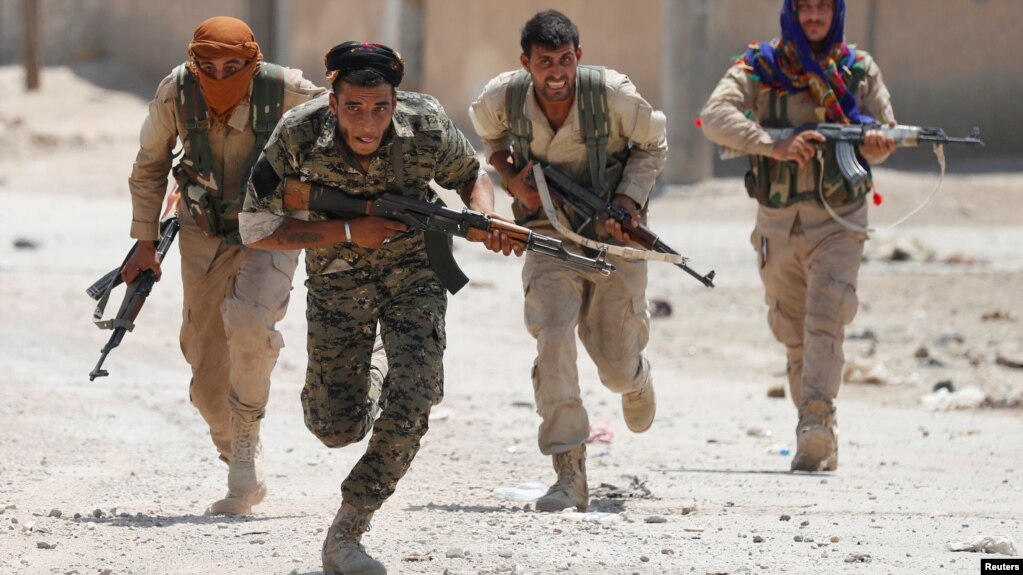Kurdish YPG fighters run across a street. VOA/Reuters.
After ISIS's defeat in Mosul, all eyes are now on the capital of the Islamic State, Raqqa. VOA. Though the Kurdish led Syrian Democratic Forces have taken around a quarter of the city, they are having an extremely difficult time holding on to the territory. ISIS is using the same tactics that they developed during the Battle of Mosul in Iraq. Those tactics include using civilians as human shields, IED's, snipers, and using drones to drop bombs. Though Raqqa is much smaller that Mosul, ISIS is proving to be very determined with the 2000 fighters they have. Most of those fighters are hard core foreign fighters and they are faced with a weaker opponent. Unlike Iraqi forces in Mosul, the SDF has fewer men, less effective weapons, and have no armor to speak of.
My Comment:
With Mosul gone, Raqqa is now the main front against ISIS. Taking the city will have huge symbolic and strategic importance. Though most of ISIS's leadership has fled from the city, Raqqa still remains the capital of the Islamic State. When the city is liberated it will be a massive defeat for ISIS.
But how long is it going to take? I am not optimistic. There are several factors that will likely slow the advance of the SDF. The first and most obvious is that the SDF doesn't have anywhere near the weapons and armor that the Iraqi Army has. Though their task isn't anywhere near as difficult as liberating a city of millions, they don't have the arms and armor they need to win this fight. Though we have started to give the Kurds some weapons and vehicles it's not like anything the Iraqis have. The SDF is a militia while the Iraqis have an actual army.
Another problem is that ISIS has some very hard core supporters in Raqqa. The city was a top destination for foreign fighters. Unlike ISIS's local supporters, these fighters are true believers and will fight to the death. They also have nowhere to go. Unlike the local fighters who can blend in with the civilians, these fighters are easily identified. They also have nowhere to flee too. Raqqa is completely surrounded now and even if it wasn't, they have no route to make it out of Syria. And even if they did, if they made it home all they would have to look forward to is a long prison sentence. These fighters will fight to the end.
Still, I don't think there is any chance of the Kurds failing to take the city. Though they lack the heavy weapons and armor of other groups involved in the conflict, they have proven to be extremely effective fighters. Urban combat might be new for them but they will adapt quickly. Their morale is generally good and their only problem is that their coalition allies aren't always on the same page.
There also seems to be little chance of a counter attack. ISIS doesn't have that many fighters left and many of them are cut off from the main territories of ISIS. Even if ISIS wanted to relieve Raqqa, they don't have the forces to do so. They also need to defend their last major city, Dier ez Zor.
If Raqqa is captured that would end any claim that ISIS is an Islamic State. In order to be considered a Caliphate, they need to take and hold territory. With their Iraqi and Syrian holdings mostly liberated ISIS will have to look elsewhere to expand.
The problem is that ISIS has few places they can expand too. Libya was the backup plan but Libya was liberated long before Mosul or Raqqa were threatened. Egypt could work as well, but they only control a tiny strip in the Sinai Peninsula. Yemen is too small and too chaotic to work as a backup base and has the added disadvantage of being a war zone that has several modern armies fighting it out. Their Nigerian Boko Haram allies could be a help as well, but that group has been crippled and is too far away from everything else to really be a factor. And though ISIS would never admit it publically, I doubt the Arab led ISIS would tolerate taking sanctuary among black Islamists...
I think the only real candidates for a backup plan for ISIS are in Asia. Right now their largest holdings outside of Syria and Iraq is in Afghanistan. Though we have been fairly effective at killing their leadership in the country, the terror group holds quite a bit of territory in the country. They also have the advantage of a weak central government and another terrorist army, the Taliban causing all kinds of trouble.
The other option is, surprisingly enough, The Philippines. Marawi city still hasn't been taken back and the Philippines has been surprisingly ineffective in fighting them. Already foreign fighters are joining the battle there and if the Duterte government proves weaker than it appears, it could be an effective backup plan for ISIS...

No comments:
Post a Comment